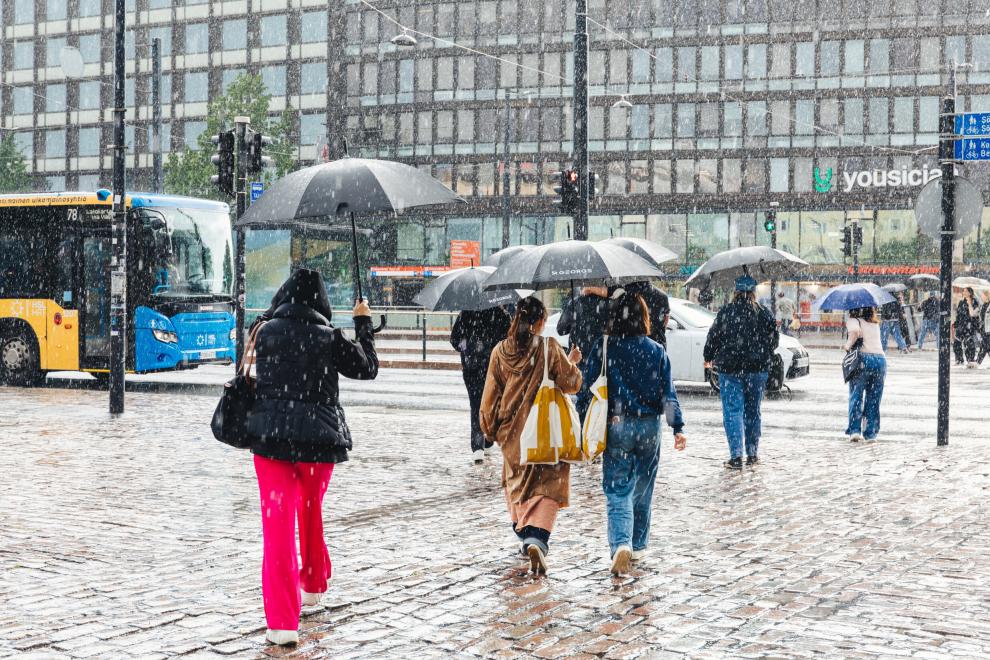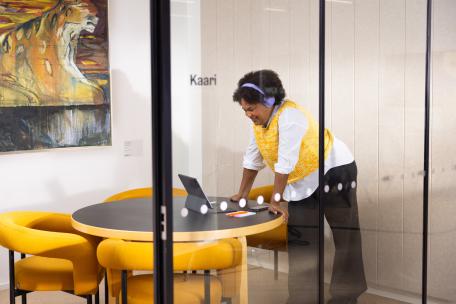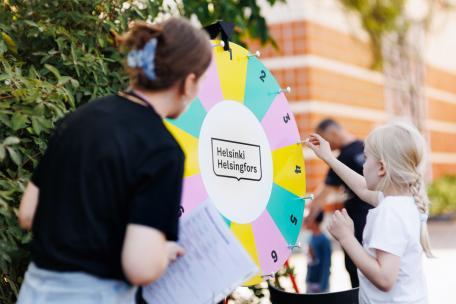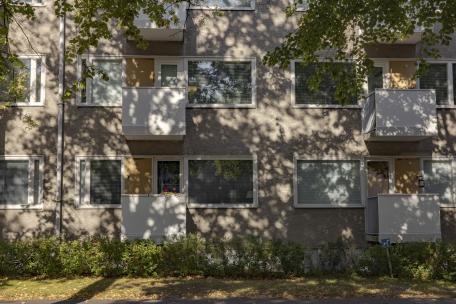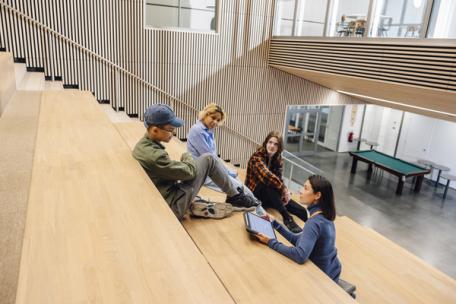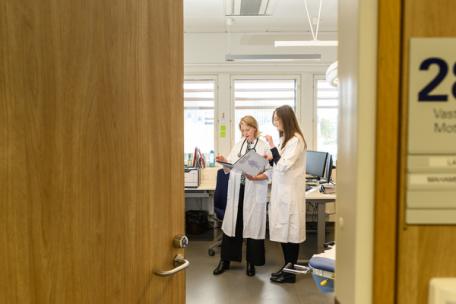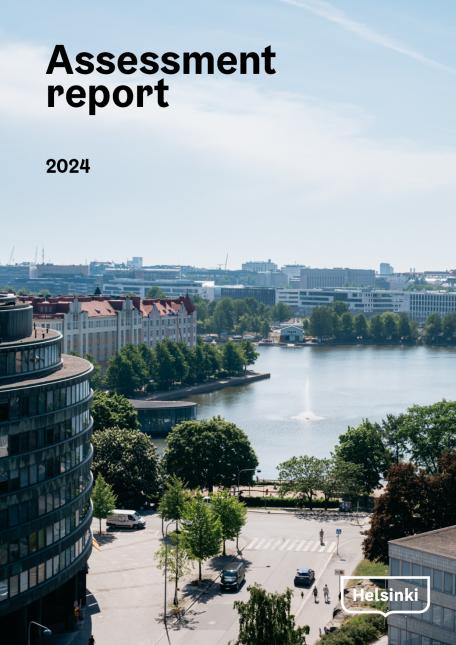Frontpage
Adaptation and preparedness for extreme weather events
Helsinki’s operational preparedness is at a good level, but adaptation and preparedness require changes in land use planning and construction and decisions on the level of preparedness.
Read more about adaptation and preparedness for extreme weather events ›
Social guidance for families with children
The City Strategy states that families will be supported in a multidisciplinary way, with resources directed towards early and wide-ranging support. Access to social guidance for families with children has been improved and the service has been expanded and developed. However, the waiting time for the service has increased, and the availability of skilled personnel has decreased.
Read more about social guidance for families with children ›
Meeting binding targets
The City met a higher proportion of its binding targets than before. 64 per cent of the binding operational targets and 74 per cent of their indicators in the 2024 budget were met.
Read more about the meeting of binding targets ›
Objectives set for the Group
Nearly half of the objectives set for the most notable subsidiaries were achieved, in addition to which nearly all of the objectives set for sports sector subsidiaries were achieved. However, the achievement of certain objectives is difficult to assess.
Read more about the objectives set for the Group ›
Data breach in the Education Division
The Education Division’s data breach revealed weaknesses in the City’s data security controls, data security maintenance responsibilities and data retention practices. The data breach highlighted the need to clarify the City’s data security management.
Read more about the data breach in the Education Division ›
The City’s finances
In 2024, expenditure growth exceeded the target set in the strategy. In the previous few years, the target was met. The loan portfolio has decreased, but gross liabilities have increased as a result of loan guarantees issued to Group entities in particular.
Read more about the City's finances ›
Implementation of productivity-enhancing reforms
City divisions and enterprises had started the planning and implementation of productivity-enhancing reforms in line with the City Strategy for 2021–2025. The Urban Environment Division and Helsinki City Construction Services Stara had systematically implemented measures in accordance with the productivity-enhancing action plan and achieved desired impacts.
Read more about the implementation of productivity-enhancing reforms ›
Promotion of Helen Ltd’s environmental objectives
Helen has, for the most part, promoted the Helsinki City Group's environmental objectives, but the ecological sustainability of the biomass that it burns requires further attention. Helen is investing in the promotion of small-scale nuclear power.
Read more about the promotion of Helen Ltd's environmental objectives ›
Coordination of roadworks and reduction of their negative impacts
The City has taken measures to reduce the negative impacts of roadworks, but these efforts should be continued in the future as well. For now, legislation does not support efforts to reduce the negative impacts of roadworks.
Read more about the coordination of roadworks and reduction of their negative impacts ›
Productivity of ICT service purchases in the Education Division
The ICT service purchases carried out by the Education Division cannot be considered to have resulted in cost savings. ICT service purchases have, however, successfully increased productivity to some extent.
Read more about the productivity of ICT service purchases in the Education Division ›
The City’s business services, cooperation with higher education institutions and investment attraction
The City’s rapid growth rate has caused challenges for companies with larger space needs, as the increasingly dense structure has resulted in a lack of space. Cooperation between the City and higher education institutions has been active.
Read more about the City’s business services, cooperation with higher education institutions and investment attraction ›
Accessibility of daycare facilities and realisation of pedagogical objectives
The City of Helsinki’s daycare centres can easily be reached on foot or by public transport. The daycare facilities largely provide a good learning environment, but there is a lack of quiet spaces suitable for small groups, according to users.
Read more about the accessibility of daycare facilities and the realisation of pedagogical objectives ›
Swedish-language health and social services for families with children
In most of the services assessed, Swedish-speaking client families are provided with the same or, in some services, even better service than Finnish-speaking ones. The City purchases Swedish-language services in certain individual child welfare services where it does not have any Swedish-speaking staff.
Read more about Swedish-language health and social services for families with children ›
Reducing homelessness
Helsinki is a pioneer in reducing homelessness. Housing counselling helps to avoid evictions, which have a high financial and human cost. There is still room for improvement in the safety of emergency housing services.
Read more about reducing homelessness ›
Information flow and cooperation between basic education and Child Welfare
Information exchange and cooperation between basic education and the child welfare needs assessment unit have primarily followed the City's guidelines. However, there are many guidelines and they are not clear and consistent in all respects. The consultation practices of pupil welfare and Child Welfare are effective, and staff competence has been developed.
Read more about information flow and cooperation between basic education and Child Welfare ›
Functioning of the service voucher system in primary health care
The use of the service voucher has not significantly contributed to the functioning of primary health care and smooth access to treatment at health stations, as it is only suitable for a small proportion of health station clients, and the availability of the voucher is limited. The service voucher has, however, improved access to treatment at times in certain areas and for individual clients.
Read more about the functioning of the service voucher system in primary health care ›
Access for elderly people from home care to 24-hour care
The access for elderly people in home care to long-term 24-hour care has improved and waiting times have been reduced. The application process may take a long time and client feedback is not collected on its functioning.
Read more about the access of older people in home care to 24-hour care ›
The effectiveness of recommendations
Measures have been taken on 96% of the recommendations presented in the 2022 assessment report.
Read more about the effectiveness of the recommendations of the 2022 assessment report ›
2024ManagementCityEducation DivisionHelsinki City Transport (HKL)Social Services, Health Care and Rescue Services DivisionCity Executive OfficeUrban Environment DivisionCulture and Leisure DivisionService CentreRescue DepartmentConstruction Services (Stara)Financial Management HelsinkiOccupational Health Helsinki
Meeting binding targets
Fifty-eight per cent of the binding operational targets in the 2023 budget and 60% of their indicators were met.
Read more about the achievement of binding targets ›
Targets set for the Group
Ownership strategies set objectives for the subsidiaries. However, assessing whether the objectives have been met is difficult because they are set so vaguely.
Read more about the objectives set for the Group ›
The city’s finances
2023 was the first year in which the expenditure and income of social services, health care and rescue services are no longer part of the city’s self-financed budget. Key figures show that the restructuring had little impact on the City of Helsinki’s financial situation.
Read more about the city’s finances ›
Supporting foreign-language pupils in comprehensive schools
The city’s Finnish-language comprehensive schools have supported foreign-language pupils in their learning, but some measures are incomplete or limited in scope. Language support varies between schools because of differences in resources and skills in providing support.
Read more about supporting foreign-language pupils in comprehensive schools ›
Achieving the Carbon Neutral Port objective
The Port of Helsinki’s emissions reduction target for ship emissions will almost certainly be reached in 2030. Emissions from heavy goods vehicles and machinery have not yet fallen significantly.
Read more about progress towards the Port’s carbon-neutrality target ›
Attractiveness of libraries and promoting reading
Visitors have found their way back to libraries in 2023 following the coronavirus pandemic, as the number of library visits has increased compared to 2020–2022. Library visits by primary school pupils are extensive, but lower secondary and secondary school pupils and students visit less.
Read more about the attractiveness of libraries and promoting literacy ›
Development of cultural grants
Cultural grants have been partly developed in line with the City Strategy and the Culture Unit’s service strategy, but it has been impossible to monitor the inclusion of new operators or art forms within the scope of support.
Read more about the development of cultural grants ›
Strengthening youth work
During the coronavirus pandemic, detached work became part of basic youth work. However, the resources of youth work units are insufficient to cope with the increased tasks and needs. Recruiting staff has become more difficult.
Read more about the strengthening youth work assessment ›
The progress of urban renewal
Urban renewal is only just beginning, and so far relatively minor measures have been taken in the areas. However, efforts have been made to promote the objectives of urban renewal.
Read more about the progress of urban renewal ›
The Social Services, Health Care and Rescue Services Division’s preparedness for incidents and emergencies
The Social Services, Health Care, and Rescue Services Division’s preparations for incidents and emergencies are mainly appropriate, but based on the findings, development work should continue in the future.
Read more about the Social Services, Health Care and Rescue Services Division’s preparedness for incidents and emergencies ›
Winter maintenance of pedestrian and bicycle paths
The city has not been able to increase the proportion of people satisfied with winter cycling. Measures to improve winter conditions on pedestrian paths are only just beginning. Taking winter maintenance into account in land-use planning solutions would allow for more effective snow management.
Read more about the winter maintenance of pedestrian and bicycle paths ›
Preventing drug-related deaths in substance abuse services
The city’s substance abuse services have facilitated access to treatment for people with drug dependencies through many reforms that have improved access to opioid substitution and detoxification treatment. The impact of the reforms on access to other substance abuse services could not be assessed because the reforms have only been in place for a very brief period and comparable statistical data were not available. Services for people suffering from drug dependence can also reduce the harm caused by drug use and improve the amenity and safety of the surrounding area, but facilities are lacking.
Read more about the prevention of drug-related deaths in substance abuse services ›
City advocacy from an economic perspective
The city’s national advocacy has developed with the mayor model over the last two strategic periods.
Read more about the city’s advocacy ›
The effectiveness of recommendations
Action has been taken on 94% of the recommendations from the 2021 assessment report.
Read more about the effectiveness of the recommendations of the 2021 assessment ›

